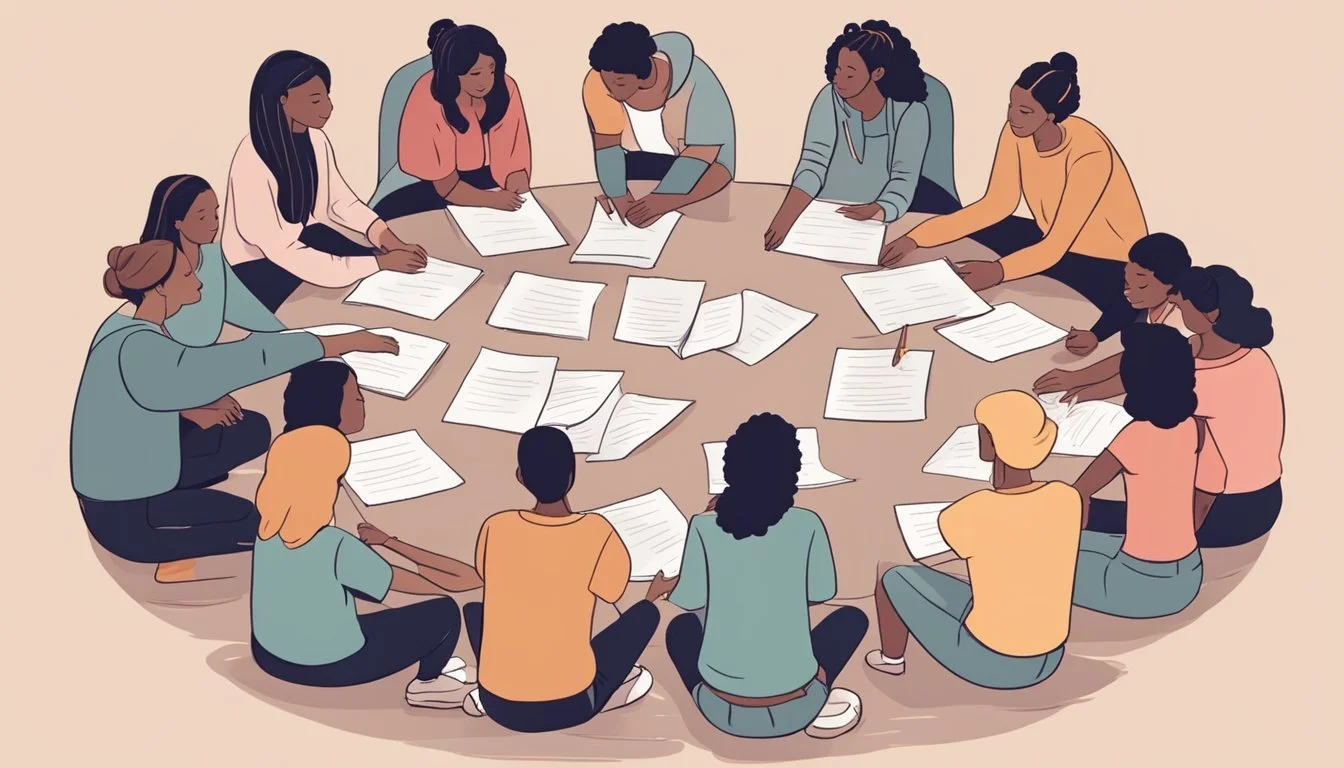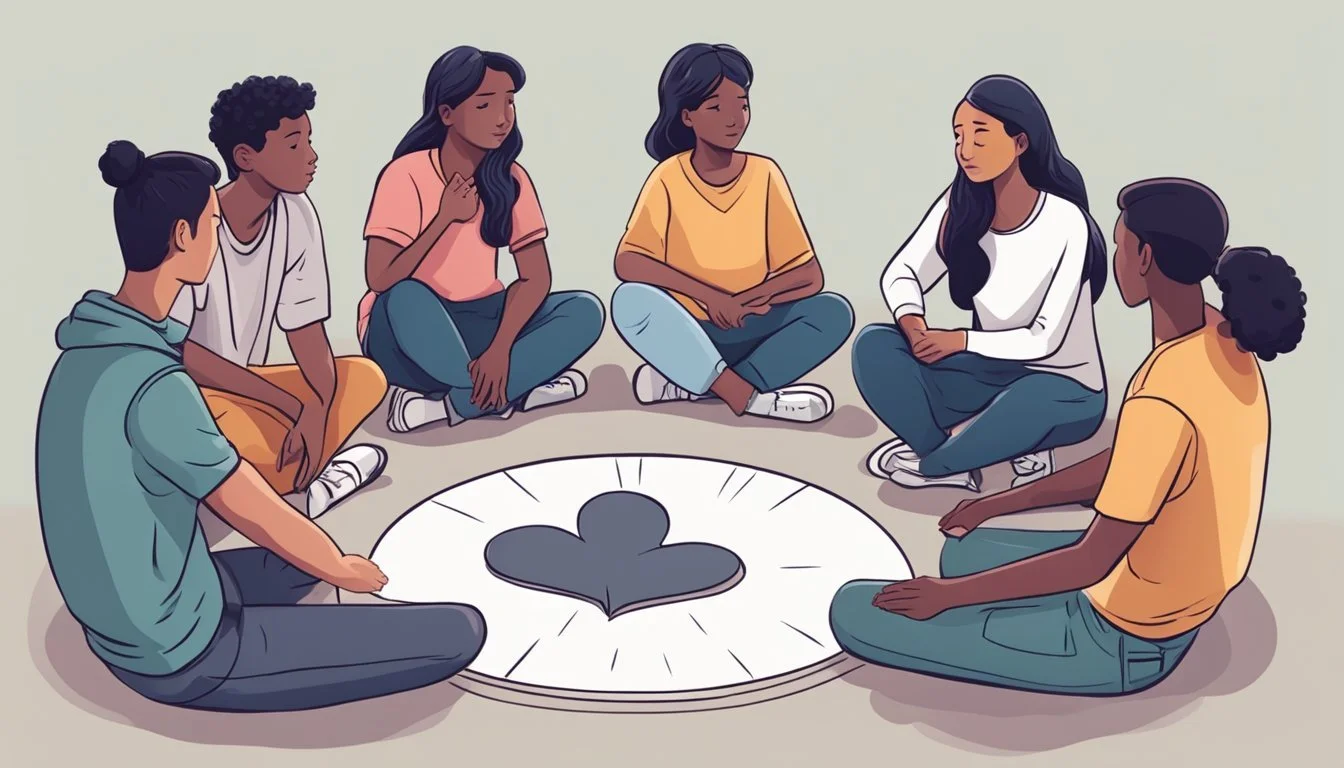8 Ways to Support a Friend Through a Breakup
Practical Tips and Advice
Going through a breakup can be one of life's most challenging experiences, leaving individuals feeling lost and vulnerable. During these times, friends play a crucial role in providing emotional support and comfort.
Knowing how to effectively support a friend during a breakup can make a significant difference in their recovery process. This article outlines practical ways to offer support, ensuring that your efforts are helpful and considerate.
1) Offer a Listening Ear
Listening is one of the most valuable forms of support. When a friend goes through a breakup, they often need someone to hear their thoughts and feelings without judgment. By being that person, you provide them with a safe space to vent.
Active listening means fully concentrating on what the other person is saying. It's essential to refrain from interrupting or offering advice unless asked. Your presence and attention can make a significant difference in how they process their emotions.
Encourage your friend to express their feelings. Simple phrases like "I'm here for you" or "Tell me more" can prompt them to share more openly. This allows them to feel validated and understood during a challenging time.
Use non-verbal cues such as nodding and maintaining eye contact to show empathy. These actions communicate that you are engaged and genuinely care about what they are experiencing. Acknowledging their pain without trying to fix it can be incredibly comforting.
By offering a listening ear, you help your friend navigate their breakup in a compassionate and meaningful way. This approach fosters emotional healing and strengthens your bond. For more insights, visit Being a Pillar of Support: How to Help a Friend Through a Breakup.
2) Help them with practical tasks
One effective way to support a friend during a breakup is by assisting with practical tasks. Taking care of everyday responsibilities can feel overwhelming for someone dealing with emotional distress.
Offer to help with household chores like cleaning, laundry, or cooking meals. These small gestures can alleviate stress and allow your friend to focus on their emotional healing.
If your friend has any errands to run, volunteer to accompany them. This could include grocery shopping, picking up medications, or even just driving them to their appointments. Your presence provides both practical assistance and emotional support.
Managing finances can be challenging during a breakup. Help them organize bills, create a budget, or find resources for financial guidance if needed. This support can provide stability and reduce additional worries.
Sometimes, lending a hand with childcare or pet care can make a significant difference. Offer to babysit, walk their dog, or even just spend time helping out with daily routines. This can provide your friend with much-needed relief and allow them some time to process their emotions.
By helping with these practical tasks, you can provide tangible support and lighten the burden for your friend during a difficult period.
3) Encourage Positive Thinking
Encouraging positive thinking can help a friend gain a fresh perspective during a breakup. Remind them of their strengths and qualities that define their character. Highlighting their resilience and ability to overcome challenges can boost their self-esteem.
Suggest engaging in activities that promote a positive mindset. This could include reading uplifting books, practicing gratitude, or spending time outdoors. Positive routines can provide distraction and relief from negative thoughts.
Encouraging your friend to write in a journal can be helpful. This allows them to reflect on their emotions and identify positive aspects of their life. It can also be an outlet for processing their feelings.
Help them set small, achievable goals that can be accomplished daily. These goals can provide a sense of purpose and direction. Accomplishing tasks, even minor ones, can build confidence and spark a sense of achievement.
Avoid belittling or dismissing their feelings. Instead, gently guide conversations towards hopeful and constructive topics. This approach fosters a supportive environment while helping them focus on brighter aspects of life.
Reinforcing positive thinking helps your friend develop a balanced outlook. This mindset shift can promote emotional healing and open up new opportunities for growth and happiness.
For more detailed guidance, check out the tips on supporting a friend through a breakup.
4) Suggest a New Hobby
Encouraging a friend to take up a new hobby can be an effective way to help them through a breakup. Engaging in new activities can provide a welcome distraction from their emotional pain.
Activities like aerial yoga or pottery classes can stimulate the mind and body, offering new ways to focus energy.
Hobbies with a learning curve can be especially beneficial. Picking up a musical instrument or taking cooking classes can give your friend a sense of accomplishment and progress.
Sports and physical activities like rock climbing or joining a local sports team can also help them feel physically better while building new social connections.
If they enjoy quieter pursuits, suggest drawing, painting, or even knitting. Creative activities can be therapeutic and provide an emotional outlet.
Encouraging a new hobby isn't just about distraction. It can be a pathway to personal growth and finding joy in new experiences. Even simple activities like gardening or reading can bring comfort and a sense of normalcy.
It’s essential to suggest activities that align with their interests and abilities. No need to push them into something they're uncomfortable with.
5) Attend Support Groups Together
Attending support groups can provide a sense of community and understanding during a difficult time. These groups offer a safe space for individuals to share their stories and hear from others who have experienced similar situations.
Bringing your friend to a support group can help them realize they are not alone and provide them with strategies for coping. Support groups often have professionals who facilitate discussions, ensuring that the conversation is constructive and beneficial.
Additionally, attending together shows your friend that you are committed to their well-being. Your presence can provide them with an added layer of comfort and security in what might feel like an intimidating environment.
Support groups can vary widely, from those that focus on specific emotions experienced after a breakup to those that employ different therapeutic techniques. Researching and finding the right group that suits your friend's needs can make a significant difference.
Participating in these groups can also be an opportunity for both of you to learn and grow from the shared experiences. It strengthens the bond of friendship and builds resilience in facing emotional challenges. Supporting your friend in this way sends a strong message of solidarity and care.
6) Plan a fun outing
Taking your friend on a fun outing can be a great way to lift their spirits. Organize activities that they enjoy, whether it's a hike, a visit to a museum, or a movie night.
Suggesting a girls' night out can be particularly helpful. Encourage them to dress up and have a night focused on fun and relaxation.
A visit to a favorite restaurant or a day trip to a local attraction can offer a much-needed distraction. It gives them something to look forward to and can provide a break from dwelling on the breakup.
For those who enjoy the outdoors, planning a picnic or a day at the beach can be refreshing. Nature has a calming effect and can help clear the mind.
Consider low-key activities like a coffee outing or window shopping if they prefer a quieter environment. Keeping it simple can sometimes be the best approach.
7) Send supportive messages
Sending supportive messages can make a significant difference for a friend going through a breakup. Short and thoughtful texts can remind them they are not alone. For instance, a simple "Thinking of you today" can offer comfort.
Consistency is key. A message such as "I'll check in with you again tomorrow" can create a reassuring routine. This shows your friend they are on your mind regularly.
Incorporating small acts of kindness in messages can help. Texting "I'm going to the grocery store. Send me your list so I can pick you up some things" can be incredibly supportive when they might struggle with daily tasks.
Nightly messages can provide a sense of stability. Saying "Good night!" regularly can offer a comforting end to their day. This small gesture can help establish a sense of normalcy.
Offering to be available for conversation is vital. Texts like "Let me know if you need to talk" or "I'm here for you anytime" open the door for them to reach out whenever they need to.
Personalized and empathetic messages are valuable. Saying "I know this is tough, but you're strong and will get through it" encourages them to believe in their resilience.
Sending supportive messages is not just about words; it’s about being present and showing genuine care. Clear communication and consistency can make your friend feel valued and supported during this challenging time.
8) Give Them Space When Needed
Everyone processes breakups differently. It's important to recognize when your friend needs time alone to reflect and heal.
Offering space doesn't mean abandoning them. It means acknowledging their need for solitude and respecting it without judgment. This can help them process their emotions independently.
Check in periodically to let them know you're there. Simple messages of support can reassure them without overwhelming.
Respect their boundaries if they request less contact. This shows that you prioritize their needs and understands the importance of time alone.
You can still provide support by being available when they reach out. Balancing support and space encourages healthy recovery.
Sometimes, giving space involves stepping back from giving advice. Let them navigate their feelings without unsolicited input.
Trust the process. Giving them space is an essential part of allowing your friend to heal.
Understanding Emotional Impact
Navigating a breakup often involves a range of intense emotions and psychological stages. Recognizing these can help you provide better support to a friend during this challenging time.
Common Emotional Responses
People experiencing a breakup frequently feel a mix of sadness, anger, and confusion. These emotions are normal and can fluctuate daily, making it essential to acknowledge and validate them.
It's common for individuals to question their self-worth and feel a sense of loss not only for the partner but also for future plans that involved them. This period may also bring about feelings of loneliness and despair as they adjust to the absence of their significant other.
In addition to these emotional responses, there could be physical symptoms such as trouble sleeping, changes in appetite, and fatigue. Understanding these responses helps in offering empathetic and practical support to a friend in need.
Psychological Stages of a Breakup
A breakup often follows distinct psychological stages similar to grief. These stages include denial, where the individual may struggle to accept the breakup, and anger, directed at themselves, their ex-partner, or the situation.
The bargaining stage involves attempts to reconcile or understand what went wrong, often accompanied by heart-wrenching questions of "What if?" or "Why?". Following this, depression may set in, characterized by deep sadness and withdrawal from social activities and interests.
Eventually, acceptance occurs, signaling the start of healing. This stage allows individuals to rebuild their identity and life without their former partner, leading to growth and the pursuit of new opportunities. Recognizing these stages helps in providing timely and appropriate support throughout the breakup process.
Effective Communication Strategies
For those wanting to help a friend through a breakup, engaging in effective communication is crucial. Adopting active listening techniques and offering reassurance can significantly impact their healing process.
Active Listening Techniques
Active listening involves more than just hearing words; it requires understanding and responding thoughtfully. Maintain eye contact to show you are engaged and nod occasionally to acknowledge their feelings. Avoid interrupting while they are speaking.
Paraphrasing what they have shared can demonstrate that you are genuinely focused. For example, saying, "It sounds like you felt really hurt when they said that," can confirm that you are on the same page. Use open-ended questions like, "How did that make you feel?" to encourage them to express more.
Non-verbal cues such as leaning in slightly or maintaining a neutral yet attentive facial expression can also convey your support. Your goal is to make them feel heard and validated.
Providing Reassurance and Positivity
Offering reassurance can help your friend see the brighter side of their situation. Simple affirmations like, "You are stronger than you think," or, "This is just a chapter, not your entire story," can provide emotional solace.
Highlight their strengths and remind them of past achievements. You might say, "Remember how resilient you were during your last challenge? You can get through this too." Encourage them to set small, achievable goals, which can provide a sense of direction and accomplishment.
Share positive outlooks for the future without minimizing their current emotions. Statements such as, "This pain will eventually lead to something better," can instill hope while respecting their present feelings. Small gestures, like sending thoughtful messages or notes, can also uplift their spirits.
Encouraging Self-Care and Personal Growth
Fostering a focus on self-care and personal growth can significantly aid a friend in navigating through a breakup. This involves helping them establish healthy routines and explore new interests.
Promoting Healthy Routines
Encouraging your friend to maintain healthy routines is essential. Consistent sleep, balanced diet, and regular exercise can stabilize their emotional state and enhance their resilience. Simple actions like taking daily walks or engaging in a yoga session can make a significant difference.
Sleep Hygiene: Ensure they get at least 7-8 hours of sleep each night. Encourage practices such as reducing screen time before bed and maintaining a regular sleep schedule.
Diet: A balanced diet rich in fruits, vegetables, and lean proteins will help in maintaining energy levels and improving mood. Suggest meal prepping or cooking together to keep their diet on track.
Exercise: Regular physical activity releases endorphins, which can alleviate feelings of depression and anxiety. Recommend activities that they enjoy, whether it’s jogging, swimming, or joining a fitness class.
Supporting New Hobbies and Interests
Exploring new hobbies can help your friend shift their focus from the breakup to personal growth and fulfillment. Encouraging them to try new activities can reignite their passion for life and introduce them to new social circles.
Creative Outlets: Engage in activities such as painting, writing, or playing a musical instrument. These can offer therapeutic benefits and serve as a means of self-expression.
Learning Opportunities: Enroll in a class or online course together. Learning something new, whether it’s a language, a craft, or a technical skill, can provide a sense of achievement and progress.
Social Activities: Encourage participation in social events or group activities. This can help them build a support network and distract from negative thoughts.
Engaging in self-care and personal growth activities not only helps in recovery but also paves the way for a more positive future.







